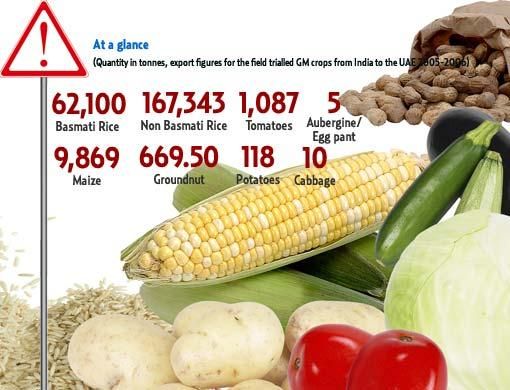Dubai: Tonnes of Indian rice exported to the UAE might have been genetically engineered and could pose a threat to traders here who re-export the produce abroad without proper labels, Greenpeace has said.
Campaigners from the international environmental organisation in the UAE last week reiterated concern on the lack of labelling of food products that contain genetically modified organisms (GMO).
India, an important supplier of food products for the UAE, has been conducting numerous field trials with GMO rice and other food crops in the recent past, according to Greenpeace.
Without clear regulations and strict enforcement, it is only a question of time until not only American but also Indian products will contain GMOs, the organisation has said, known for its lobbying against GM crops and claims not enough is known about them to classify them as totally safe.
Khalid Al Awadi, Assistant Director of Public Health Department and head of food control section at Dubai Municipality said that as no federal level decision has been made to ban or label GM foods, the municipality was not implementing any action to force traders to label their products.
"We are looking into having foods being tested at customs to see if they contain GMOs but not yet," he said.
"It is better for GM food to be declared and to tell the consumers so they have the choice to decide but in the UAE there is no law on this as yet. Even in Europe these products are not banned, but they are looking into labelling issues," he told Gulf News.
Al Awadi added it might take up to five years to get labelling legislation in place in the UAE.
India-based Greenpeace campaigner Rajesh Krishnan said India currently exports seven types of produce known to be genetically engineered (GE) to the UAE, including basmati and non-basmati rice, tomatoes, aubergines, maize, groundnut, potatoes and cabbage.
Consumer rights
According to Krishnan, the re-export industry needs to watch out when sourcing agricultural products from India, especially crops, that are being genetically modified as traces of GM ingredients could have a major impact if found in the products exported to Europe and elsewhere where such laws are strictly followed.
Andi Freimueller, project coordinator of the Greenpeace International Genetic Engineering Campaign, said without knowing what products contain, consumers are being stripped of their basic rights.
"We are sad to find out that genetically engineered foods are still out there and the government has not acted as swiftly as others elsewhere in implementing food labelling legislation," he said.
He said, according to research, when given a choice the majority of consumers opt for products that have not been genetically-engineered, which explains why traders do not label their products.
Since their last visit to the UAE in January, when Greenpeace highlighted that 40 per cent of corn-based products from supermarkets contained genetically modified organisms, some but not all supermarkets removed GM foods.
Your comments
Some of the crops mentioned in this report are being developed in India. But none of them have reached even open large scale multilocation field trials, the step before permission by the Genetic Engineering Approval Committee, for cultivation in India. When the development of these crops is at this preliminary stage, there is no cope for producing the large quantities of GE food products. Rajesh Krishnan should be asked to provide evidence for the allegatons made.
C K. Rao
Bangalore,India
Posted: October 07, 2007, 18:31
The fact is none of the crops that Rajesh Krishnan mentions have been officially approved for commercialisation, and as such do not occur in Indian markets. All of them are under various stages of development and testing in India.
S. Shantharam
Ellicott City, MD,USA
Posted: October 07, 2007, 17:44
I wish this gets as much attention as banning smoking at the shopping malls.
Tityana
Dubai,UAE
Posted: October 07, 2007, 13:48
Yes, it is important to label GM for the consumers to opt for their choice. It might bring a health impact on persons who are sensitive to GM food, besides paying rich to the less-worthy food stuff. Authorities need to impose regulations on this issue.
Selva
Dubai,UAE
Posted: October 07, 2007, 13:22
It is a pity that we do not have a federal law in the UAE that prohibits the import of genetically modified food products. However, Greenpeace activists must be commended for their effort in creating more awareness of this problem.
Ashley
Dubai,UAE
Posted: October 07, 2007, 11:16
We should also have a close look at the oversized chickens in the market, especially the ones produced in UAE and other foreign countries.
Jasmine
Dubai,UAE
Posted: October 07, 2007, 10:51
It is regrettable that Dubai has become a dumping ground for anything that is fake, counterfeit and genetically modified.
Haresh
Dubai,UAE
Posted: October 07, 2007, 07:32













